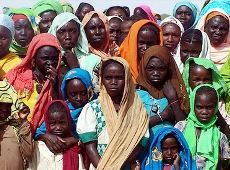Darfur refugees plea for more protection
Oct 15, 2006 (KASSAB) — Refugees in the camps scattered across Darfur live in fear, saying the African Union peacekeeping mission does little to protect them even as rising violence is driving away crucial humanitarian aid.
 “You have been here for three years now, and what have you done for us?” a tribal leader bitterly asked a delegation of AU soldiers and police that came to the Kassab refugee camp last week.
“You have been here for three years now, and what have you done for us?” a tribal leader bitterly asked a delegation of AU soldiers and police that came to the Kassab refugee camp last week.
As they often must, the peacekeepers patiently explained to camp delegates that they had come to Darfur only to monitor the violence and have no mandate to fight it.
“You are witnessing what happens, but you aren’t helping,” retorted Attaieb Adem, a leader of the 25,000 refugees in Kassab.
Since fighting between rebels, the Sudanese army and a militia of Arab nomads began in 2003, some 200,000 people have died in Darfur and 2.5 million have been displaced.
The AU mission came in 2004, but refugees’ anger over their perceived ineffectiveness is strong.
“If there is nothing you can do, then you might as well go home, so that the United Nations come,” Adem said.
He referred to refugees’ widespread hope that August’s U.N. Security Council resolution to send 20,000 U.N. peacekeepers to Darfur will be implemented. The AU force’s mandate expires at the end of the year.
However, Sudan’s president fiercely opposes the proposal, saying it would breach the country’s sovereignty. For now, the U.N. seems bent on buying time by sending more than 100 military and civilian advisers to reinforce the AU mission and pushing for its mandate to be prolonged in order to avoid a dangerous security vacuum.
But refugees in Kassab say they do not see how their security could get any worse in their camp, on the frontline of a murky war zone where some 2,000 rebels clash with about 5,000 Sudanese soldiers and another 2,000 militia.
The militia, called the janjaweed, were recruited among nomad Arabs to help quell the ethnic African rebels and are blamed for much of the looting and violence against refugees.
But rebel violence and hostility to aid workers also has escalated since May, when one rebel faction signed a shaky peace agreement with the government.
Humanitarian groups and AU police say they withdrew from Kassab in September mostly because of the rebel violence.
The camp’s clinic closed, so refugees in need of treatment trudge to the nearest town. Refugee women say taking that road, or even collecting firewood around the camp, exposes them to robbery and rape.
“Every day we risk being beaten, or even worse,” said Kharidja Ibrahim, some of whose family had gone wood-gathering that morning. “We’re waiting. In a few hours, we’ll hear what has happened to them.”
Tribal leaders say security has grown so bad that armed men now plunder the camp at will.
“Four days ago, they came in broad daylight and stole 84 goats,” said Sheik Abdallah Shariff. He said nights are even worse.
“We can’t sleep, we go to bed with our shoes on,” in case they have to flee, he said.
Egyptian Maj. Ahmed El Serafy, who commands AU police in the sector of Darfur that includes Kassab, says improving security in Kassab is urgent for what few forces he has — 82 police for an area of 13,000 square miles.
“I knew it was going to be bad, but I never thought it would be this bad,” he said.
Serafy said police would resume day patrols in Kassab next week and hoped this show of force would improve security. But the AU’s officers go unarmed, and he said some were afraid to return into the refugee camp.
Even though refugees are frustrated with the AU peacekeepers, camp leaders pleaded with the delegation last week to return soon, saying time is running out.
“Hurry up, because for now we’re on our own,” said Sheik Youssouf Aldoun. “He is all we have for protection” he said, pointing his palms toward the sky in a Muslim gesture that signifies God.
“The government just wants us to disappear and die, and the rest of the world isn’t doing anything” said one refugee leader, who asked not to be named because he says authorities retaliate against those who speak to the media.
“This is our land. We will stay, even if the killing lasts 20 more years,” he said.
